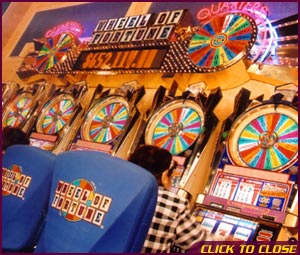 Another Stereotype of the Month entry:
Another Stereotype of the Month entry:
 Another Stereotype of the Month entry:
Another Stereotype of the Month entry:
Other view: Gaming the Capay Valley
Will Baker — Special to The Bee
Published 2:15 a.m. PST Thursday, January 2, 2003
State and local governments, the tribal gaming establishment and various newspapers have lined up to oppose situating Indian casinos near cities. This chorus of nays exposes an elaborate hypocrisy.
Let's start with Gov. Gray Davis' disapproval of a site near Interstate 80 and Reed Avenue in West Sacramento for the Upper Lake Pomo tribe. According to his spokesman Russ Lopez, "The governor feels strongly that gaming should not be allowed in urban areas on non-traditional sites." He wants to restrict the action to rural areas, such as the Capay Valley, where I live.
The irony here is dark. All of California is ancestral land for native Americans, whose Mongol forerunners ranged from sea to Sierra some 5,000 years ago. Davis and his allies aim to legitimize only the white tradition: Plant a flag, claim the continent, exterminate most of the prior residents, then cede to a few survivors the rights to scattered scraps of bad land.
Another motive for restriction crept out in a recent San Francisco Chronicle editorial, which mentioned that urban gaming seems to "create facilities unwelcome to many neighbors." Whoops. Apparently Proposition 1A has a downside. That measure, which state voters approved in March 2000 by 65 percent to 35 percent, amended the California Constitution to allow tribes to operate slot machines and house-banked card games such as blackjack and poker.
But casinos are not strong on family values — addiction, prostitution, loan-sharking, embezzlement and suicide can lurk beneath gaming palaces' glitzy facades. So city dwellers wanted to keep this new industry under a not-in-my-backyard quarantine: Give the Indians gambling, but herd the visiting addicts and hustlers onto a reservation way out in the country — too long a drive for soccer moms who might burn a kid's college fund.
The quarantine didn't work for gamblers' itch. Teenagers pinched mom's plastic and flushed funds away, joining the horde of retirees, Joe Sixpacs, little old ladies, and plain Johns and Janes who poured $5 billion into California's Indian casinos last year.
Which brings us to the big winners — the 20-odd tribes (out of 109 certified in California) located within an hour or two of major cities. These tribes enjoy a fabulous boom, sucking in profits of up to $1 million a day. They also pipe substantial cash to state, county and city politicians to insure this favored position.
Lucky tribes, pliable pols and nervous urbanites won't rock this yacht, but their luxury cruise floats on monstrous injustices.
At the inner circle of Indian gaming, the bigger the casino and smaller the tribe, the richer its individual members will become. Meanwhile, under terms of state compacts, tribes without casinos (whatever their size) get only a crumb from the wealthy gamers — a flat million a year. Thus the bigger the poor or landless tribe, the less each member receives.
Unfair is also the rule for non-Indian California. Urban areas have the infrastructure to deal with white-hot tribal gaming, but are excused from doing so. By federal fiat, huge casinos are plopped in the country despite local zoning. Farmers and villagers are overrun 24/365 by thousands of daily visitors who jam roads, create litter, increase the crime rate and threaten scarce resources.
What's next? Well, unless they can obtain legal recourse to protect their way of life, rural communities near major gaming tribes are likely to disintegrate as casinos expand into destination resorts. Tribes will buy more land and more political muscle to put that land in trust. That will allow development of golf courses, theme parks, convention centers, air strips, motels and minimalls — far more profitable than the orchards, row crops, hayfields and ranches once touted as California's pride.
So much for our pledge of justice for all. Indian destiny — chronic poverty or wealth beyond one's wildest dreams — depends on how close the graves of slain ancestors lie to the cities wherein their conquerors still hold court. Meanwhile, non-Indians living between those graves and a big city discover that laws passed to insure their peace and security are now only chips in a game of ravening greed, to be lost in the next roll of loaded dice.
About the Writer
---------------------------
Since 1974, Will Baker has operated a small farm in the Capay Valley, site of the Cache Creek Indian Bingo and Casino, owned by the Rumsey Band of Wintun. The casino is about 20 miles west of Woodland. It opened as a bingo parlor in 1985 and is one of the most successful in Northern California. The tribe is currently doubling the size of the gaming facility and adding a 200-room hotel. In October, Yolo County supervisors and tribal officials signed a deal that requires the tribe to pay for much of the off-rancheria impact of the expansion.
Rob's comment
Some snappy responses to Baker's stupid comments:
Related links
Rich Indians
Greedy Indians
The facts about Indian gaming
|
. . . |

|
All material © copyright its original owners, except where noted.
Original text and pictures © copyright 2007 by Robert Schmidt.
Copyrighted material is posted under the Fair Use provision of the Copyright Act,
which allows copying for nonprofit educational uses including criticism and commentary.
Comments sent to the publisher become the property of Blue Corn Comics
and may be used in other postings without permission.